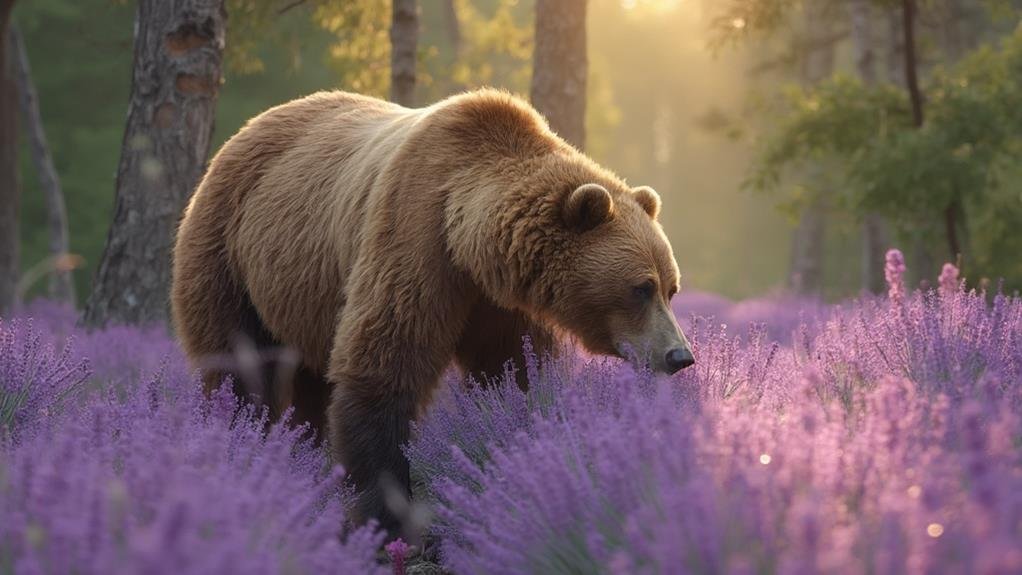Do Bears Like Lavender?
No, bears don’t typically like lavender. While they have an incredible sense of smell and can certainly detect the scent of lavender, it’s not a food source, so they aren’t naturally drawn to it.
However, research indicates that lavender can affect bear behavior in some interesting ways, and it may even have a calming influence.
How Bears Detect Scents (Including Lavender)

Bears possess a highly developed sense of smell, far superior to humans. This allows them to locate food, navigate their environment, and detect potential danger from miles away.
Their olfactory system has several key features that contribute to this remarkable ability:
- Large Olfactory Bulb: The part of the brain that processes scents is significantly larger in bears than in humans.
- Highly Developed Olfactory Epithelium: The lining of their nasal cavity contains millions of olfactory receptors that bind to odor molecules.
- Unique Nasal Anatomy: A long, narrow nasal cavity provides a greater surface area for these receptors.
This combination allows bears to detect even the faintest odors, making their sense of smell about seven times stronger than a bloodhound’s! So, while bears can easily detect the scent of lavender, their response to it is more complex than simply being attracted or repelled by it.
How Does Lavender Affect Bears?
Lavender doesn’t attract bears because it’s not a food source. However, studies suggest that lavender can influence bear behavior in a few key ways:
- Altered Behavior: The presence of lavender in a bear’s environment may lead to changes in their activity patterns and routines.
- Reduced Aggression: Some studies suggest that lavender may have a calming effect on bears, potentially reducing aggressive behaviors. This could be due to linalool, a compound in lavender known for its sedative properties.
- Increased Exploration: Bears exposed to lavender might display more curiosity and explore their surroundings more actively.
It’s important to note that each bear is an individual, and their response to lavender can vary based on factors like personality, past experiences, and the specific environment.
Scents That Attract Bears

Bears are primarily attracted to scents associated with food. Their powerful sense of smell is geared towards finding potential meals. Common scents that attract bears include:
- Sweet, high-calorie foods: Honey, nuts, fruits, and berries.
- Fish and other meats: Bears are omnivores and are drawn to the scent of protein sources.
- Cooking oils and grease: Residual odors from food preparation can linger and attract bears.
- Food wrappers, trash, and recyclables: Any items that may contain food residue.
To avoid attracting bears, it’s crucial to properly store food and trash in airtight containers, maintain a clean campsite, and avoid using perfumes or colognes in bear country.
Lavender as a Potential Calming Agent for Bears

While more research is needed, some studies have shown that lavender may have calming effects on bears, particularly those in captivity. Possible benefits include:
- Reduced stress and anxiety: The linalool in lavender may have a relaxing effect.
- Decreased pacing and stress-related behaviors: Bears exposed to lavender may exhibit fewer signs of stress.
This research suggests potential applications for lavender in managing stress in captive bears, but its effects on wild bears require further investigation.
Bear-Plant Interactions and Aromatic Plants
Bears interact with a variety of plants in their environment, including those with strong aromas. Some plants, like those in the mint family, may actually repel bears due to their volatile organic compounds. Others, with fragrant flowers or ripe fruits, may attract bears because they signal a potential food source. Understanding these interactions can provide valuable insights into bear behavior and habitat preferences.
Conclusion
While bears have a keen sense of smell and can detect lavender, it doesn’t significantly attract or repel them. Their primary focus is on food-related odors for survival. The effects of lavender on bear behavior are complex and require further research. When in bear country, it’s essential to prioritize proper food storage and waste management to minimize the risk of bear encounters. Don’t rely on lavender or any essential oil as a bear deterrent.







